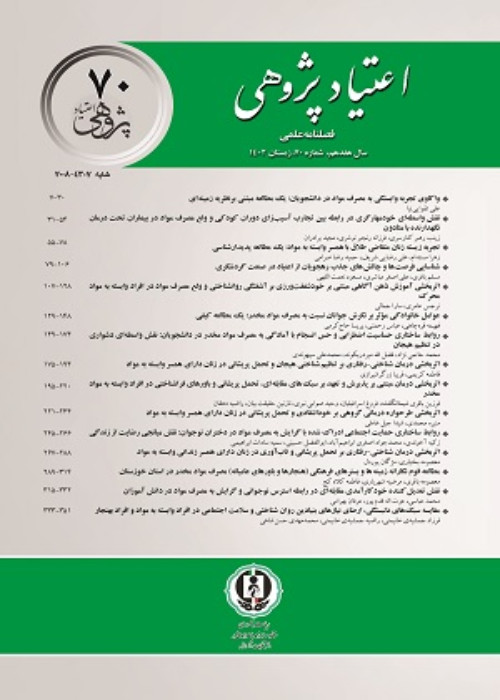Development and Validation of the Coping Model based on the Semantic-value Components of Language in Relapse Prevention among Substance Abusers
Author(s):
Abstract:
Objective
This research sought to develop and validate a coping model based on semantic-value components of language in relapse prevention of substance abuse in Isfahan in 2016. Method
A mixed research method was used in this regard. The sample units in the qualitative section included a number of substance abusers that were selected via purposive sampling method. The sample size in this section was considered based on grounded theory in such a way that the interviews would reach saturation. The researcher reached saturation after 15 interviews, which means that no further indicators were added to the constituent elements of the semantic-value components of the language from the eleventh interviewee onward. The statistical population of this study in the quantitative section included 30 drug abusers who were selected by random sampling method and were matched in two groups, i.e. experiment and control ones. The experimental group received nine 45-minute counseling sessions based on semantic-value components of language and the control group remained on the waiting list. In-depth interviews were conducted to collect data in the qualitative section where data were recorded with the subjects' confirmation. After the preliminary study on four experts, the content validity of the interview was assured considering the opinion of the four experts (psychologists and consultants). In order to collect data in the quantitative section of the study, Wright Relapse Questionnaire was used (1993). The collected data in the qualitative section were analyzed through coding and the data in the quantitative section were analyzed through covariance analysis. Results
The results showed that substance abusers with submissive and passive identities were in the process of breaking the structure and eliminating the hegemony of the dominant discourse in the society under the influence of the dominant discourse in the consumer society. In the fight (antagonism and otherness) with dominant authorities, such as the family, counselor, and guide; they also take refuge in their own central signifier, i.e. drug use. With the formation of empty signifier, which is distance from intimacy, affection, and trust, they turn to drug use once more with inefficiency and insufficiency in the society and stabilize the meaning of consumption. Conclusion
Counseling based on the therapeutic model of semantic-value components of language is significantly effective in preventing substance abuse relapse.Keywords:
Language:
Persian
Published:
Research on Addiction, Volume:12 Issue: 49, 2019
Pages:
269 to 293
magiran.com/p1954910
دانلود و مطالعه متن این مقاله با یکی از روشهای زیر امکان پذیر است:
اشتراک شخصی
با عضویت و پرداخت آنلاین حق اشتراک یکساله به مبلغ 1,390,000ريال میتوانید 70 عنوان مطلب دانلود کنید!
اشتراک سازمانی
به کتابخانه دانشگاه یا محل کار خود پیشنهاد کنید تا اشتراک سازمانی این پایگاه را برای دسترسی نامحدود همه کاربران به متن مطالب تهیه نمایند!
توجه!
- حق عضویت دریافتی صرف حمایت از نشریات عضو و نگهداری، تکمیل و توسعه مگیران میشود.
- پرداخت حق اشتراک و دانلود مقالات اجازه بازنشر آن در سایر رسانههای چاپی و دیجیتال را به کاربر نمیدهد.
In order to view content subscription is required
Personal subscription
Subscribe magiran.com for 70 € euros via PayPal and download 70 articles during a year.
Organization subscription
Please contact us to subscribe your university or library for unlimited access!




